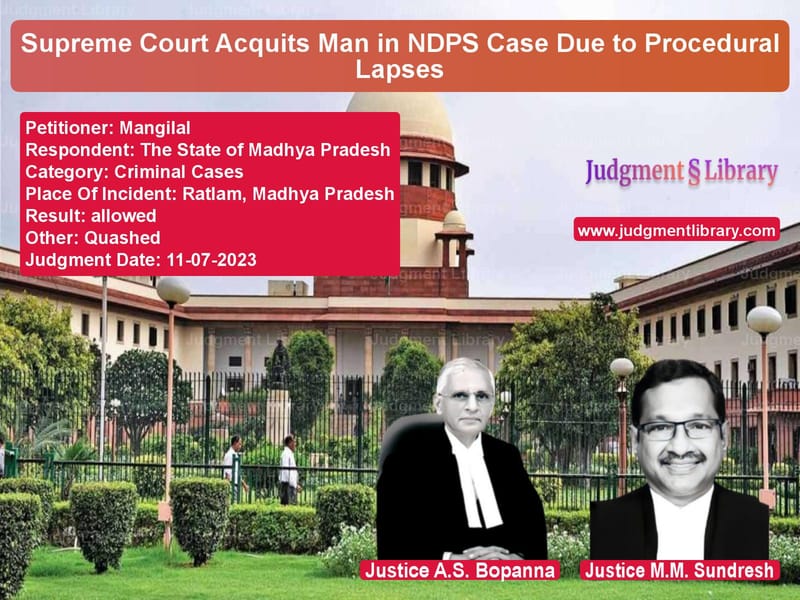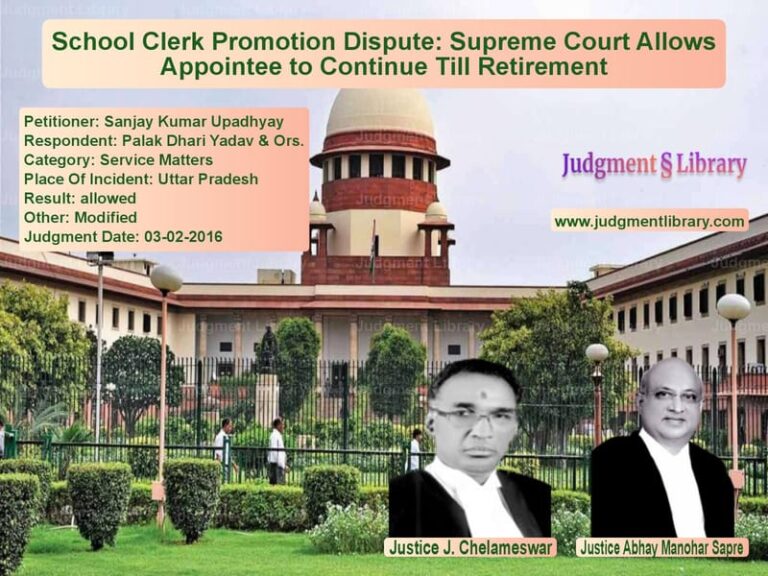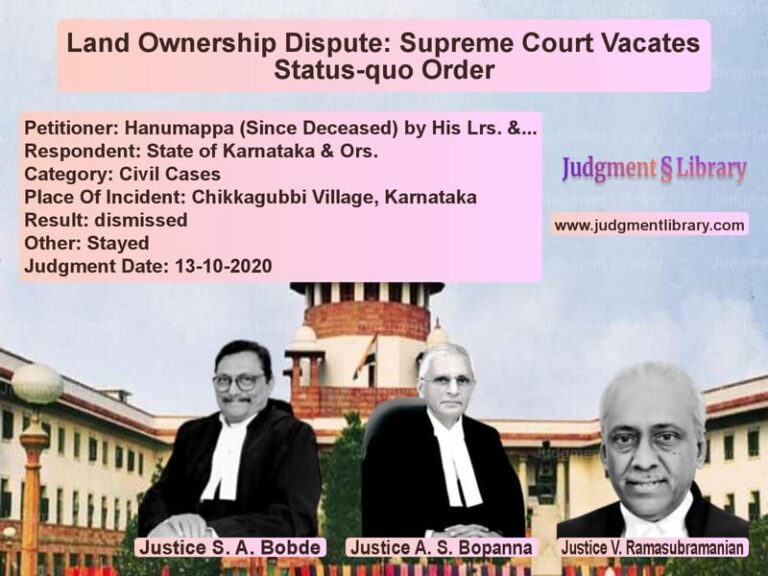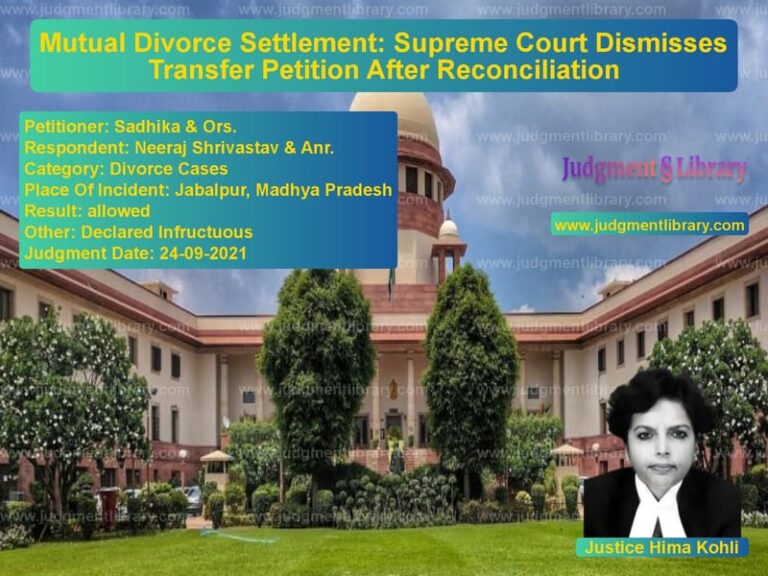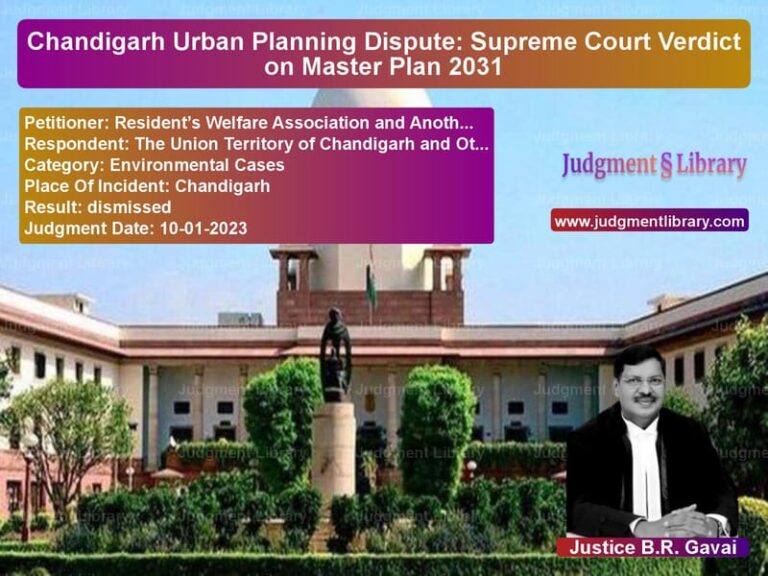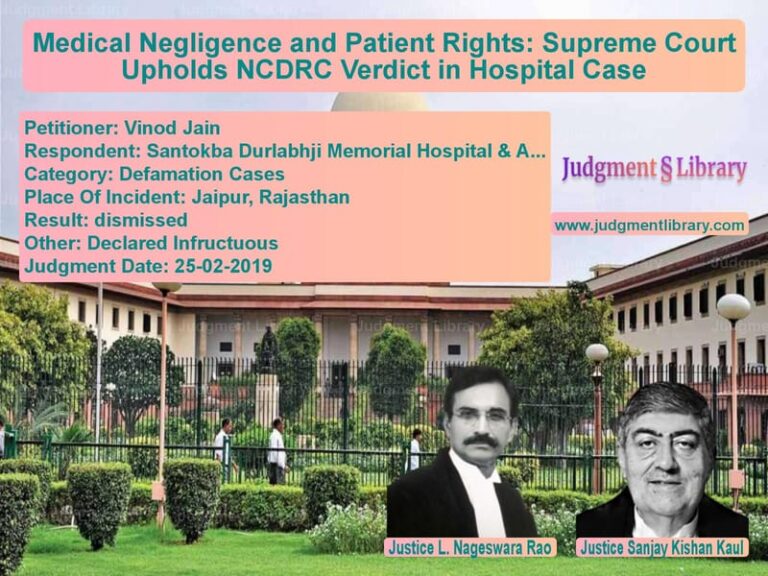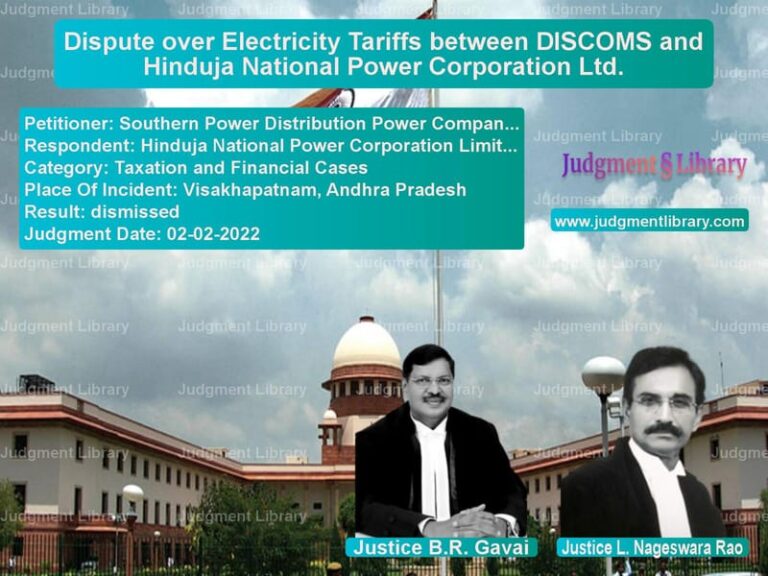Supreme Court Acquits Man in NDPS Case Due to Procedural Lapses
The case of Mangilal v. The State of Madhya Pradesh is a significant ruling in which the Supreme Court acquitted the appellant who was convicted under the Narcotic Drugs and Psychotropic Substances Act, 1985 (NDPS Act). The Court found that the prosecution failed to follow mandatory procedures regarding the seizure and handling of contraband, thereby casting serious doubt on the entire case. This judgment reinforces the importance of procedural compliance in NDPS cases.
Background of the Case
The appellant, Mangilal, was charged and convicted under Section 8(b) read with Section 15(c) of the NDPS Act. He was sentenced to 10 years of rigorous imprisonment by the Additional Sessions Judge, Special Court NDPS, Jaora, District Ratlam, Madhya Pradesh. The High Court upheld the conviction, leading to this appeal before the Supreme Court.
According to the prosecution, on May 20, 2010, the police received information that the appellant and another individual, Mathuralal, were transporting poppy straw. A tractor carrying the contraband was intercepted, and a seizure was made. The appellant was arrested, and a case was registered under Crime No. 53/10. The final report was submitted on September 13, 2010. However, several procedural lapses were noted in the case.
Read also: https://judgmentlibrary.com/supreme-court-cancels-anticipatory-bail-in-haryana-land-fraud-case/
Key Legal Issues
- Did the prosecution comply with Section 52A of the NDPS Act regarding the seizure and storage of contraband?
- Did the failure to produce the seized material in court weaken the prosecution’s case?
- Was there adequate evidence to convict the appellant beyond a reasonable doubt?
Petitioner’s (Mangilal’s) Arguments
The appellant’s counsel argued:
- The prosecution failed to produce the seized contraband in court, violating Section 52A of the NDPS Act.
- Two independent witnesses (P.W.2 and P.W.6) who signed the seizure memo turned hostile, stating that they were not present at the time of seizure.
- P.W.5, a police witness, testified that the narcotic substance was already present at the police station before the alleged seizure, indicating fabrication.
- The prosecution did not examine two key witnesses who attested to the arrest memo.
- The FSL report relied upon by the lower courts was insufficient in the absence of primary evidence (the seized substance).
Respondent’s (State of Madhya Pradesh’s) Arguments
The prosecution contended:
- The contraband was seized in accordance with the law, and the FSL report confirmed that it was a narcotic substance.
- The conviction was based on the testimony of police officers, whose statements should be relied upon.
- The accused was caught in possession of a commercial quantity of poppy straw, justifying the sentence.
Supreme Court’s Observations
On Compliance with Section 52A of the NDPS Act
The Supreme Court emphasized the mandatory nature of Section 52A, which requires:
- Preparation of an inventory of seized drugs.
- Certification of the inventory, photographs, and samples by a Magistrate.
- Destruction of seized narcotics following proper procedures.
The Court noted:
“When there is non-compliance of Section 52A, where a certification of a Magistrate is lacking, any inventory, photograph, or list of samples would not constitute primary evidence.”
On the Failure to Produce the Seized Contraband
The Court found that the prosecution had failed to produce the actual narcotic substance in court. It cited previous rulings, including Noor Aga v. State of Punjab (2008) and Jitendra v. State of M.P. (2004), which held:
“In cases under the NDPS Act, the non-production of the seized substance in court casts serious doubt on the prosecution’s case.”
On the Witness Testimonies
The Supreme Court noted that key witnesses P.W.2 and P.W.6, who signed the seizure memo, turned hostile and denied being present. Additionally, P.W.5’s testimony stating that the narcotics were already at the police station before the seizure further weakened the prosecution’s case.
On the Use of the FSL Report
The Court ruled that an FSL report alone is insufficient to establish guilt in the absence of primary evidence:
“The FSL report, without the production of seized material and compliance with Section 52A, does not establish the prosecution’s case beyond a reasonable doubt.”
Final Judgment
The Supreme Court set aside the conviction and sentence, ruling:
- The prosecution failed to prove guilt beyond a reasonable doubt.
- Non-compliance with mandatory procedures under the NDPS Act rendered the case unreliable.
- The appellant was acquitted of all charges.
- He was ordered to be released immediately if not required in any other case.
Implications of the Judgment
This ruling has significant implications:
- Reinforces Strict Procedural Compliance: Law enforcement agencies must follow proper seizure, storage, and certification procedures under the NDPS Act.
- Ensures Fair Trials: Convictions must be based on substantive evidence, not merely police testimonies and FSL reports.
- Protects Against Fabricated Cases: The ruling prevents wrongful convictions based on procedural lapses.
Conclusion
The Supreme Court’s decision in Mangilal v. State of Madhya Pradesh highlights the importance of procedural safeguards in NDPS cases. By acquitting the appellant, the Court reaffirmed that procedural lapses, non-production of evidence, and unreliable witness testimonies cannot be the basis for conviction. This ruling serves as a crucial precedent in ensuring fair trials and preventing misuse of stringent laws.
Read also: https://judgmentlibrary.com/supreme-court-modifies-conviction-in-kerala-school-bus-incident/
Petitioner Name: Mangilal.Respondent Name: The State of Madhya Pradesh.Judgment By: Justice A.S. Bopanna, Justice M.M. Sundresh.Place Of Incident: Ratlam, Madhya Pradesh.Judgment Date: 11-07-2023.
Don’t miss out on the full details! Download the complete judgment in PDF format below and gain valuable insights instantly!
Download Judgment: mangilal-vs-the-state-of-madhya-supreme-court-of-india-judgment-dated-11-07-2023.pdf
Directly Download Judgment: Directly download this Judgment
See all petitions in Drug Possession Cases
See all petitions in Fraud and Forgery
See all petitions in Judgment by A. S. Bopanna
See all petitions in Judgment by M.M. Sundresh
See all petitions in allowed
See all petitions in Quashed
See all petitions in supreme court of India judgments July 2023
See all petitions in 2023 judgments
See all posts in Criminal Cases Category
See all allowed petitions in Criminal Cases Category
See all Dismissed petitions in Criminal Cases Category
See all partially allowed petitions in Criminal Cases Category

